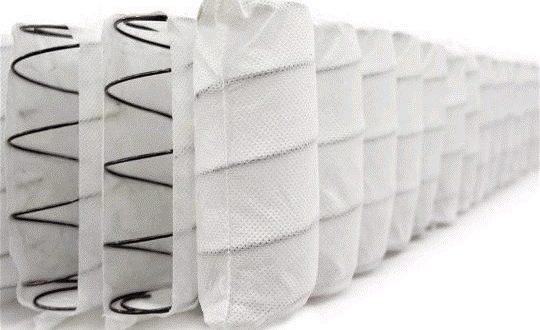We took the pulse of the sector from the main companies of Turkiye’s mattress spring industry. We have compiled the problems of the iron and steel sector and the proposed solutions with the statements we received from the managers of Boyçelik, Kar-as, Nano Spring, Yılmar, Ay Spring and ZebSprings.
The mattress sub-industry industry continues to grow and develop in Turkiye as well as globally. Although the spring sector, which is one of the basic building blocks of the industry, continues to grow and develop in parallel with the mattress sub-industry industry, manufacturers face many problems arising from both bureaucratic processes and costs in the export process. Especially the shortage of raw materials, trade embargo and logistics costs are among these problems. In order to keep the pulse of the sector and to hear the voice of the producers, we talked to the producers about the problems and solution suggestions.
Feridun Tosun, Boyçelik Export Officer: The iron and steel sector in Turkey is the sector that feels the contraction in global demand the most.
Turkey has an important place in the world iron and steel industry. In 2023, it contributed 27 billion dollars to Turkey’s exports. 12.3 per cent of Turkey’s exports are provided by the iron and steel sector. For this reason, the sector that feels the contraction in global demand the most in Turkey is the iron and steel sector. While the Turkish economy grew by 5.6% and 4.5% between 2022 and 2023, the steel industry contracted by 12.9% in 2022 and 4% in 2023.
It was seen that the inflation in global markets limited foreign demand and the most intense effect of this was experienced in the European market. At the same time, increases in energy and labour costs, protectionist policies, quotas, taxes, etc. regulations, cargo footprint processes have been seen to have difficulties in competition, which have forced exporter companies. The interest rate decisions of the European Central Bank and the US Central Bank are also one of the important factors that negatively affect the sector and reduce foreign demand.
It is predicted that the sector will recover if countries change their interest rate policies, inflation processes are taken under control and protectionist policies are abandoned. In this context, the relevant institutions of the state should carry out activities to increase free trade, especially with regard to quotas and import taxes.
Kar-as Board Member M. Önder Aslan: Solving the raw material problem will encourage us to produce more
The growth and development of the mattress sub-industry of course means the growth and development of our industry. We are satisfied with the progress and the point reached by the mattress supply industry in the last 5 years. However, if we go back 4 years ago, the increasing freight and raw material prices as a result of a crisis that engulfed the whole world during the pandemic process had put us and our sector stakeholders both globally and domestically in a difficult situation. Since then, although the freight crisis has been overcome and prices have decreased, problems continue to be experienced in the supply of raw materials at reasonable prices. The momentum we have gained in exports in the last 3 years amortizes this issue, but solving this problem or taking steps towards it will encourage us to produce much more.
Nano Yay Company Owner Serkan Kır: Reducing raw material costs is a must for the sake of the sector
If we talk specifically about the mattress industry, I think that thanks to the contributions of the IBIA Association and the IBIA Expo fair in the last 3 years, we have overcome the stagnation we experienced during the pandemic period and the sector has regained its vitality. When we talk about the spring industry, of course, we encounter different and more dynamic dynamics. The biggest factor here is iron-steel prices and logistics costs. Especially in terms of raw material costs, the iron and steel sector has been in great trouble since the pandemic process. I do not know how much these costs can be minimized in the coming period, but they need to be reduced for the sake of the sector and for us to move more comfortably in terms of production.
Yılmar Company Manager Zübeyde Yılmaz: Foreign legislation and export incentives should be reorganized
We are one of the largest spring companies in the mattress sub-industry sector operating in Turkey and working for mattress companies both at home and abroad. Since 2001, we have been operating in this sector and we have an annual production capacity of 45,000 tonnes. As such, we can directly observe and even personally experience the problems in the spring and steel wire sector. As of now, both globally and in Turkey, there is a raw material problem and the problem of rising iron and steel prices. In addition to this problem, which started with the pandemic and still continues, we personally experienced the logistics prices and freight problems in the first two years of the pandemic and experienced the process. Although the freight problem has been solved for the last two years, the problem in raw material prices still continues. If these problems are solved, both the global iron and steel industry and the global mattress industry and naturally the Turkish mattress industry will grow much more. The sector is becoming more and more competitive every day, both as a steel producer and a spring producer. But since the market has not grown that much, the material has become worthless. We cannot achieve a sales volume that can meet the increasing raw material value. I think that foreign legislation and export incentives should be reconsidered.
Kürşat M. Katırcıgil, Member of the Board of Directors of Ay Yay: In order to provide better service to the sector, disadvantages should be reduced
As a company that manufactures in the mattress industry, it is our greatest wish that this industry grows and develops. However, some disadvantages need to be reduced in order to provide better service to the mattress industry. There are export quotas imposed on some of the countries we export to, shortage of raw materials, and issues that our state elders should help us with prices and logistics costs. If these problems are solved, I trust both ourselves and our sector stakeholders that we will increase both more production, more domestic supply and higher export rates. I hope that these problems will be solved and we will be able to trade more easily and bring more foreign currency to our country.
ZebSprings Sales & Marketing Manager Mahmut Öztürk: There is a supply-demand imbalance in the iron and steel sector
The spring and iron and steel sectors are also adversely affected by the ongoing economic recession process worldwide. In our country, the spring production sector for mattress and furniture is export-oriented, as in other mattress and furniture component sectors. Currently, the demand level in all foreign markets, which are potential for our country, is below expectations. Manufacturers in our sector are trying to compensate for this contraction in demand with market expansion efforts.
In the iron and steel sector, which provides the basic raw material input for the spring sector, there is a similar supply-demand imbalance. In addition to the restrictive factors such as quotas in Europe and “section 232” tax in the USA, which continue in the main target markets for the iron and steel sector, the trade restrictions resulting from the recent sad developments in the Middle East have further limited the foreign market alternatives of iron and steel producers. Simultaneously, China, the world’s largest steel producer, is pursuing an active policy in its export markets, which poses an additional challenge for the Turkish steel industry.
Apart from the stagnant demand, another important agenda of the iron and steel sector is the adaptation process to Europe’s ongoing CCSM – Carbon Control Mechanism at the Border. In this context, sector players are both analyzing the current situation and continuing their process improvement investments.
In terms of the spring sector, iron and steel production in our country is sufficient in terms of technical and capacity. The spring sector is able to supply the steel grades required for spring production from steel producers in our country and does not experience a shortage in supply capacity. This situation provides an important advantage for our spring sector.
 SleepTech Magazine Mattress, Accessories, Machinery, Raw Materials
SleepTech Magazine Mattress, Accessories, Machinery, Raw Materials



